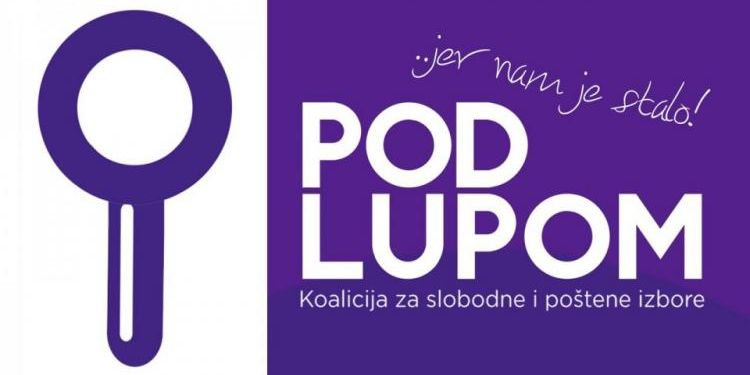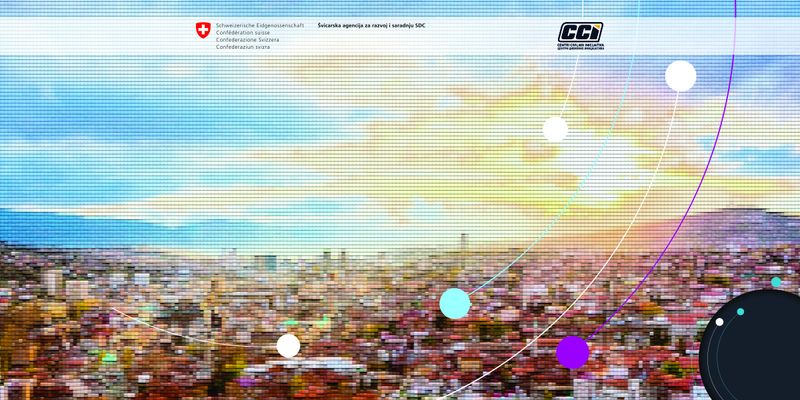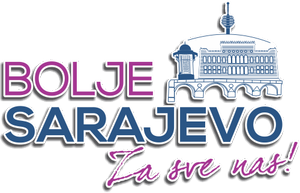CCI’s beginnings are associated with the work of other international organizations in Bosnia and Herzegovina that are generally identified with the notions of democratization, election process monitoring, third sector strengthening – these are National Democratic Institute (NDI), International Foundation for Electoral Systems (IFES), etc. It is from the international organizations that the founding core of CCI was born. In 1998 and 1999, led by a number of years of experience the domestic civil activists tried to form a first large, and in the right sense of the word – Bosnian Herzegovinian non-governmental organization that will, both territorially and program-wise cover the whole country and all its citizens. An organization which would unwaveringly and actively advocate protection of human rights, freedoms, tolerance and respect for differences, accountable and transparent governing of the state, accountable and participatory role of citizens in decision-making, as well as establishing the mechanisms for growth and development of domestic non-governmental sector.
As soon as in its early days, CCI was slowly profiled in what Edward Shils, one of the best known civil society theoreticians describes as a function of civil society organization, which is to care for the interests of the overall society and for the common good.
During the period 1999-2004 CCI also pioneered the activities on organizing citizens in local communities in order to solve the most acute problems launching and successfully implementing several dozens of local or regional campaigns, which contributed toward the improvement of quality of life for dozens of thousands of citizens – the campaigns contributed to strengthening direct democracy and enabled the first big successes of advocacy initiatives at higher levels, started and led by civil society organizations. CCI also worked on education of both formal and informal citizens’ groups, individual and non-governmental organizations, strengthening their awareness on the need and the ways of citizens’ participation in decision-making processes at all authorities’ levels. We trained and helped the interested groups of citizens and NGOs in designing and implementing the campaigns for solving their problems. Through its work, CCI involved over a million BH citizens.
In the first couple of years since its founding, CCI was also focusing its efforts on election process monitoring, where it was a leader of the so-called civil monitoring of elections, which, along with the then missions of OSCE and other international observers, was a guarantee for both fair and honest election race and legitimacy of newly-elected authorities.
Getting more and more involved in BH political life and wishing to enable the citizens to take part in the election process as the international community’s engagement in election activities subsided, CCI was the first ’umbrella’ organization that gathered a network of 310 non-governmental organizations and organized the campaigns for domestic, non-party monitoring of elections in 2000 and 2002. CCI included more than 6000 volunteer observers through these campaigns and contributed toward the implementation of free and fair elections in BiH.
During a certain time period of its development and activity, CCI focused on strengthening the accountability of elected representatives and increasing transparency, as well as enhancing the user-oriented work of representatives of the authorities. CCI was more and more oriented toward the highest authorities levels influencing the public policies and advocating citizens’ interests.
After finalizing the legislative framework for forming and work of non-governmental organizations, during the period 2002-2006, the number of these organizations rapidly grew, and so did the number of those organization that in their scope of work showed compatible values, interests and goals similar to the ones advocated by CCI. On the one hand, that was to help strengthening the front of civil society organizations that more and more filled in the gap between the citizens and the state, between the politics and capital and between the problems and solutions. On the other hand, both cooperation and competition within the non-governmental sector grew, leading in the long term toward the sector specialization, professionalization and expertise, as necessary prerequisites for adequate participation in public life and fulfilling its own purpose.
During that time period, CCI became one of the leaders of increasingly loud and articulated criticism of the current authorities at various levels, and, at the same time, one of the leaders of third sector partnership with the government institutions and political parties.
Some of the most significant successful advocacy campaigns include the following:
2000 and 2002 – CCI implemented the campaigns for domestic non-party election monitoring in BiH, and included over 300 non-governmental organizations and 9000 volunteers in its activities.
2003 - CCI successfully completed the campaign for the adoption of the Standard Rules for Equalization of the Opportunities for Persons with Disabilities, ratified by BH Council of Ministers on 30 June 2003.
2004 – CCI ran a successful campaign for direct election of municipal mayors in FBiH, resulting in amendments to FBiH Constitution thus enabling the citizens to directly elect the leading peoples of their municipalities.
2004 – CCI ran a successful campaign for the adoption of the Law on Proclaiming the Prokos Lake a Monument of Nature.
2000 -2005 In almost every municipality and in cooperation with the municipal authorities, CCI contributed toward citizens’ taking part in decision-making at the local level, as it worked on adoption of different decisions that guarantee citizens’ influence on the budgeting, by setting up permanent policies of surveying citizens at the local level during adoption of the budget and of other strategic documents at the level of local self-governance throughout the country.
2005 – 2005 – CCI designed an analysis on legal framework and cash flows from games of chance, entitled „Where Does the Money from Games of Chance Go?“, and started an initiative for allocating a part of the money collected from taxes and games of chance for social, charity and other purposes. This initiative was soon to be transformed into a Law, in the Republic of Srpska.
2005 – In cooperation with BiH Court, CCI contributed to building of the Network of Support to BiH Court (non-governmental organizations, governmental agencies, religious communities, police forces, social work centers, etc.), the goal of which was to support BiH Court in enforcing law by promoting the rule of law, motivating the citizens to seek the information on the work of the Court and by setting up communication between the Court and the public.
2002 -2006 – CCI was making efforts in informing the citizens about their representatives in cantonal authorities, about the responsibilities and competencies of the cantonal authorities level, models of citizens’ participation, etc., via printing and distribution of the „Guide through the Cantonal Power“
2006 – CCI opened up the first non-politicized public discussion on BiH capital. A non-defined status of the city of Sarajevo motivated CCI to carry out a survey which provided initial arguments for the next steps toward solving that issue.
The years 2005 and 2006 become turning years for CCI’s new, quality step forward in a number of respects. The first is that CCI becomes, among others, a sort of a trust, i.e. an organization that provides financing sources to other NGOs. During 2005 and 2006, based on the activity platform of Movement GROZD, and with the support of international donors, CCI provided support to over 20 projects of other NGOs that were active in the advocacy and promotion of the Civic Platform, and on spreading the GROZD coalition, in seeking responsibility from political parties in pre-election campaign, as well as in promotion of the election law and combating election abstinence, and solving or decreasing dominant life problems such as poverty, unemployment, social deprivation, poor position of pensioners, the young, refugees and displaced persons, and the like. Over a million of signatories of citizens’ support were gathered for the civic platform, which represents the biggest organized and successfully implemented petition of support gathering, and at the same time, the country’s most legitimate document.
2007 -2012 After a promise made to the citizens that it would work on monitoring the performance of the authorities with regards to solving the key problems from the Civic Platform, CCI introduced and set up a system of monitoring the performance of the authorities and their commitment to solving citizens’ key problems. As part of its efforts, in addition to quarterly reporting on the performance of the state, entities’ and cantonal executive and legislative authorities, CCI provided in its reports recommendations to the authorities for improving the accountability, efficiency and effectiveness, as well as the recommendations related to necessary steps to be taken for improving the standard of living in BiH.
2010 – During the election campaign for BH general elections, CCI provided a source of relevant and objective information to the citizens, concerning the performance of the authorities and the individuals who ran again for 2010 Elections.
During the election campaign, in six different TV shows, CCI provided the media space to the citizens enabling them to present their views of the situation in the country, of the work of the authorities, salaries of the employees in institutions, etc. CCI’s messages sent out during the election campaign reached almost 1.000.000 BH citizens. As a result of the website and work on monitoring the performance of government institutions, political parties in BiH did not re-nominate about 32% of candidates who already had a mandate in parliaments.
2010 - CCI presented the web portal www.vlastibih.com - this multifunctional web tool gave both the citizens, media and political subjects a possibility to independently monitor, compare and analyze the work of institutions and individuals and to make their own judgments.
2010-2011 CCI published the first comprehensive and, in a quality manner structured document, representing a basis for successful promotion of scholarship policies. The document offers a critical analysis of the existing theory and practice in the field of scholarship granting, a comparative analysis of budget allocations and recommendations with guidelines for further action. Exceptional progress was noticed compared to the period before the start of the campaign, in the segment of allocations and number of students receiving scholarship. For example, the total number of students receiving scholarship in 2010 was 20.620 which was an enormous increase compared to 2007, when there were only 10.730 of them. An increase trend was also noted in allocations for pupils’ and students’ scholarships, notably by 121% compared to the year 2007.
2011 – In cooperation with the experts, members of BH Central Election Committee, civil society organizations and media, CCI developed a comprehensive study on the election system: „BH Election System; A Critical Overview and Compilation of Election Legislation“.
2010 -2011 CCI launched a serial of TV shows “Nema više zeko rek'o”, in which it „COURAGEOUSLY“ recognized, explored and highlighted the topics, phenomena and absurdities in our society through ’men in the street’ stories, and reached the most responsible levels, sought answers and action in order to solve the problems. The addressed topics included corruption in the field of healthcare, employment, education and other issues, such as what exactly we pay during the registration of vehicles, introduction of subscription tickets for using the highway, free of charge job vacancy announcements, the system of collection of public utility bills, etc..
2010 – At CCI’s initiative, FBiH Government passed the Games of Chances Act (June 2010) which enabled the organizations of the persons with disabilities and other civil society organizations with a pronounced social and humanitarian component to apply for the funds collected through the games of chance, which would improve their position and increase the influence of these organizations.
2010 – At CCI’s initiative, FBiH Government adopted the Rulebook on Plastic Packaging Management (FBiH Official Gazette“, 83/10), which represents a first step toward an efficient and cost-effective management of PET packaging.
2010 – CCI developed the study „Obligatory Secondary School Education – Ambiance and Perspectives“ which provided an overview of BH educational system and gave an incentive to policy drafters to base both the development and new social and economic relations on citizens’ knowledge and competencies. At CCI’s initiative, in the school year 2010/2011, Sarajevo Canton introduced the obligatory secondary school education.
2010 – At CCI’s initiative, after a number of years during which BiH was the only country in the region without a strategic document for solving one of the most acute problems in the country – unemployment, BiH Employment Strategy was adopted, on 14 July 2010, by BiH Council of Ministers.
2011- Upon CCI’s initiative, the Republic of Srpska Government adopted, on 24 March 2011, the RS Employment Strategy and in September of the same year the Action Plan for Employment, which became a binding act providing guidelines and definition of the funds allocated for different ministries with a goal of influencing the increase of employment in the RS.
2011 – In cooperation with the experts, the members of BH Central Election Committee, civil society organizations and the media, CCI developed a comprehensive study on the election system: „BH Election System; A Critical Overview and Compilation of Election Legislation“.
2011 - CCI raised an issue of the need to reform the employment policy, with an emphasis on the role of employment bureaus and acceleration of starting the reforms of labour legislation, i.e. of FBiH Labour Act.
2011 – CCI started an information campaign for fighting corruption in health sector and for the rights of patients and citizens in accordance with the prevailing laws in the field of health protection and health insurance in BiH. Cooperation was initiated with healthcare institutions throughout the country during which the adoption of the Rulebook on Fighting and Prevention of Corruption in accordance with BiH Strategy for Fighting Corruption was advocated. As of 2012, the Rulebook was adopted by 45 healthcare institutions.
2011 - CCI started a campaign for reducing the use of plastic bags in BiH.
2012- CCI started an online TV – Inicijativa TV (www.inicijativa.tv) aimed at educating and informing the public in BiH about the key problems of BH society, with an intention to contribute toward better understanding of the work of civil society organizations in BiH, and establishing of partnerships between citizens, NGO sector and authorities in BiH.
2012 - CCI launched the first virtual parliament in the country www.virtuelniparlament.ba, a virtual edifice with more than 16 parliament halls, 60 MPs’ offices... The virtual parliament offered a possibility to Parliament members in BiH to communicate with the citizens, and an opportunity to the citizens to have an insight in the work of parliament members and to be directly involved in decision-making processes.
2004 -2012 - CCI investigated the situation regarding citizens’ participation in decision-making in BiH, with an overview of the legal framework and citizens’ experience related to participation in decision-making at the local level. Evaluating the perception and experience of citizens and public servants with regards to the criteria, legal framework and practice, CCI assessed the annual progress of citizens’ influence on decision-making.



















